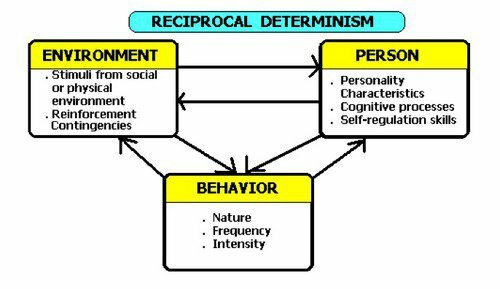Learning, Knowledge and Human Development MOOC’s Updates
Essential Update #3
Social learning is based on a theory developed by psychologist Albert Bandura that suggests that learning is a cognitive process that takes place in a social context and occurs exclusively through observation or direct instruction, even in the absence of motor reproduction or direct reinforcement.
This theory emphasizes not only through observing stimuli in our environment but learning how to execute specific actions by mimicking others
An immensely important aspect of this theory is called reciprocal determinism.
This is the idea that an individual, their environment and behaviors all influence each other and should all be taken into consideration when researching and/or studying how we learn.
Bandura believes that our personality is determined by the interaction of these three factors. Our personality is determined by the way these categories interact or exchange. For example, we can choose our environment (such as where we live or work), and that environment depends a lot on how we behave. But our individual characteristics (such as our goals or beliefs) led us to choose this environment. Let’s say it’s your first day of school. You are usually shy and quiet, preferring to sit in the back of the room to avoid any unwanted attention. It has a lot to do with your qualities as an individual. However, when you enter the room, you see an acquaintance giving you a sign to take an empty seat next to them. You sit next to them. This is because the environment gives impetus, and it changed behavior.
There are four conditions that are necessary for effective modeling to take place:
The first one is attention. Various factors can affect our attentiveness. This includes the relevance complexity, distinctiveness and functional value of the subject material The characteristics of the student also affect attention; What kind of past reinforcement do they have? Their sensory capacities and arousal level both affect their attention.
Retention is the second condition necessary for effective modelling; Do they remember what they paid attention to? This includes symbolic coding mental images, cognitive organization, symbolic rehearsal and motor rehearsal
The third condition is reproduction. Reproducing said image this includes their physical capacities to imitate their model and self observation of reproduction
The last condition needed for effective modeling to take place is motivation; Does the student or learner have a good reason to imitate? Do they have incentives? Has their imitation in the past been rewarded? Are they able to recall the reinforced model?

.png?Expires=1764990354&Signature=eJJ5kn0bnG89dB6ACGCu~GF8ck3XgvT4euhyDkNWe5VoRy25geN0myeHCyUC5Fj9VauF55lbuM6GEGg4793RN3QisjB4X~UP1PTKU~bXDH-I2Akrzh4p8JguoZV6VyGy9yP5USs9wnfGHJm3dlOUeomzcXuktpY45thF6YmOwZuN-VNvWlVTaKa0LH0YVasSoZeZDCEK4szrGZtg2DmyZiex7-luo8fwB-aCnGCxZwo5Ziq4aWoYLcSfZsUahuj-IHNMZvjB2SYYpmDZSJf3ooMNls-uclHs6NIMzEfoB4q3XWZgESHdgzW~Wo~Ka~bQjY2L2LKzQDFr4hTP8i52Uw__&Key-Pair-Id=APKAJELYXGUCCDL7FUQA)

